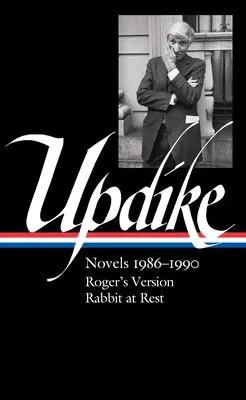John Updike, at the peak of his powers, concludes his unforgettable
Rabbit series and reimagines Hawthorne's Scarlet Letter for
contemporary America
The latest volume in Library of America's John Updike edition presents
two essential novels by the master stylist of postwar American fiction.
Roger's Version (1986) stakes out ground that encompasses Updike's
recurring themes of sex, desire, and adultery as well as an emerging
interest in the cosmic implications of contemporary scientific
breakthroughs. In a dazzling refashioning of the love triangle at the
heart of Hawthorne's The Scarlet Letter, twin adulteries unfold,
revealing the heightened contrasts and inequalities of Ronald Reagan's
America.
Widely hailed upon publication as a masterpiece, awarded a Pulitzer and
a National Book Critics Circle prize, Rabbit at Rest (1990) wraps
up the saga of Updike's most enduring protagonist and concludes his
"surpassingly eloquent elegy for his country," in the words of Joyce
Carol Oates. Now in his mid-fifties, the outwardly comfortable and
complacent Harry Angstrom has settled into leisured obsolescence,
dividing his time between Pennsylvania and the Valhalla Village
retirement community in Florida. But alongside his golfing, junk-food
consumption, and other forms of ease there loom unavoidable markers of
Rabbit's human fragility and his mortality.

